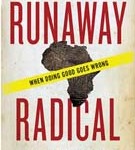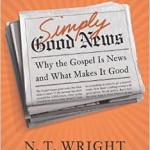Rebecca: Recently, I’ve been drawn more and more toward Jesus’s words concerning the poor and lowly. I feel a bit as if God led me to your book because even though I do believe I need a greater focus on Jesus’s words, I also know I have the same tendency to religious obsessiveness and to nothing ever being enough. So, I’m wondering: How do we balance a concern for what is close to God’s heart–the poor and the downtrodden–with the freedom and grace found in the Gospel? We’re supposed to care about social justice but how do we keep that concern from destroying us or becoming a false Gospel?
Jonathan: What I have to keep reminding myself is that Jesus didn’t have a messiah complex. There are plenty of stories in the Bible about Jesus healing the sick and feeding the hungry, but what about all the people he wasn’t able to help?
If Jesus had been obsessed with helping everyone, he wouldn’t have had time to party or fish or preach or do any of the other things we see him do in the Gospels. So if Jesus didn’t feel the need to do it all, why do we?
I think the best we can hope to do is just love the person in front of us. That’s the example I see in Jesus and in his parables, especially the one about the Good Samaritan. The hero in the story doesn’t save the world – he just loves his neighbor.
Rebecca: Do you have any thoughts on how your story should impact our approach to missions and ministry giving? How can we avoid contributing to organizations that engage in spiritual control? How can we ensure our young people are protected from abuse when they enter into ventures in world missions or into Christian ministry?
Amy: I know some people want to reason through what Jonathan endured; they want to believe his abuse could have been avoided if we had just done our homework. But the truth is we did our homework, meeting with the head of the mission agency regularly. The organization even had the blessing of Jonathan’s church. But they were a young agency with no track record. Still, I’ve heard from veteran missionaries from respected organizations with good track records who tell me there are pockets of abuse even within their agencies. I think what leaves young missionaries so vulnerable is the fact that stories like Jonathan’s don’t get told. The litany of success stories gives young people false expectations and their parents a false sense of security. Until there is a commitment to telling the truth, I’m not sure there is a surefire way to know which organizations to support and which to avoid.
Rebecca: Jonathan, I noticed in the closing pages that you were struggling with the label of “Christian” and all the baggage that comes with it. I noticed that you also raised the issue of how spiritual control is often manifest in our doctrine fights. I agree that less control would be really healthy. Do you think there is a healthy way to maintain doctrinal integrity and the central, core matters of faith? Is there a gracious, non-controlling way to uphold orthodoxy? Are there some matters simply too important to surrender? How do we manage to not be controlling and yet also maintain a content-full faith, a creedal faith?
Jonathan: For me, having come out of a rigid, harsh faith, I try not to hold on to my core beliefs too tightly anymore. I still have strong opinions on things, but I never want to get to the point where I’m unwilling to exchange those ideas for something more grace-filled. I think there’s a responsible way to stick to your guns and stay true to your beliefs while at the same time not forcing those beliefs on other people.
What I’ve found helpful when discussing doctrine is to first offer my take on things, and then, to the best of my abilities, include as many other interpretations and views on the subject as I’m aware of. I think it’s important to show others that there are always options and different ways of looking at any given belief, and mine is just one of many.
Lastly, I think it’s important to admit that at the end of the day, we really don’t know for sure. We can be fiercely convinced of something and still acknowledge that we only see in part.
Rebecca: And one more question, if I may: Do you think the cause of your crisis, Jonathan, was the books and ideas of the radical movement or something more internal in you or both? In other words, are the books inherently flawed theology? Or are they merely twisted easily into something not life-giving?
Amy: My vote is for inherently flawed theology. I’m not faulting the authors, though they need to take some responsibility, because publishers often make decisions about how controversial or radical they want a book to be. For example an author might present something hypothetically; the publisher might say, “Let’s make that declarative.” The message moves from admonition to accusation. On the other hand, when a megachurch pastor and bestselling author has to begin a sermon series on grace because his own congregants are reacting to his radical message with the same misguided zeal as Jonathan, then I think you know you’ve created a monster. Unfortunately, that pastor wasn’t there with his counterpoint on grace when Jonathan – or countless other young people – began reading his books.
Jonathan: I think it was the perfect storm. Certainly, there was something in me that sought out guidance from more and more extreme voices, something that made me especially susceptible to these intense calls to action. Not everyone who reads the same books I read is going to drop out of college, give away all their stuff, and move to Africa. But I haven’t talked to anyone who’s walked away from these books without feeling guilty for not being “radical” enough, and I think that’s a huge red flag.












